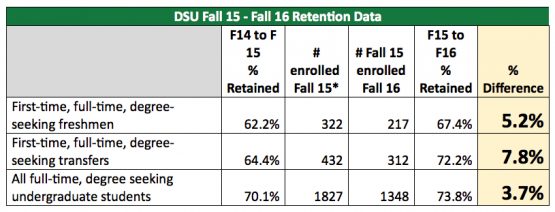Delta State University continues to exhibit increases in institutional retention rates thanks to a campus-wide effort.
A comparison of data between Fall 2014-15 and Fall 2015-16 shows an increase in three major categories:
Improving retention at Delta State has been at the forefront of the agenda for Dr. Charles McAdams, provost and vice president for Academic Affairs.
“Helping students succeed is at the heart of what we do at Delta State University. We are committed to implementing strategies to help students create a path and to stay on a path to degree completion,” said McAdams. “Completing a degree is the most important step a student can take to make sure he/she can enter their chosen career path and fulfill their professional aspirations.”
McAdams believes the positive retention rates are a result of the university’s redesigned First Year Seminar program, increased use by faculty and staff of the S.O.S. Early Alert program, and most importantly, the increased collective awareness to reach out to students who may be struggling.
“Earlier this fall, we announced new initiatives that will increase our retention efforts and hopefully build upon the success we have experienced,” added McAdams. “The new initiatives we have put into place this fall that we hope will help with this year’s freshmen class are 15 is Full-Time, Academic Maps and Meta-Majors. It is essential that all degree-seeking undergraduate students enroll for a minimum of 15 hours each semester in order to graduate in four years. We also encourage our students to seriously consider taking at least one class each summer to help them stay on track to graduate on time.”
Additionally, there is now an academic map for each major listing the specific courses students need to complete their degree. Courses are listed by semester in order to make planning and registration easier. Academic Maps are located at https://www.deltastate.edu/academic-affairs/academic-maps.
Meta-Majors features a cluster of courses in four broad areas for undecided students to make certain all the courses they take in their first year will count towards a degree in the area they have selected. These Meta-Major choices are provided to undecided students in Academic Advising Services in the Student Success Center.
Finally, this January, faculty will have access to a new software tool, CRM: Advise, which will make it easier to stay in touch with their advisees and to reach out to those students who may need extra help in their classes.
McAdams said much credit should also be given to Dr. Christy Riddle and her staff in the Student Success Center.
“Our approach is two-fold. We focus on big picture items, such as First-Year Seminar and academic maps, but we also focus heavily on one-on-one interaction with students,” said Riddle. “Since Delta State is a small university, our faculty, staff and Student Success team know our students. As the saying goes, ‘DSU students are not just a number,’ but individuals with potential for success. Our efforts are based upon the experiences and attributes of our students, not simply a cookie cutter, off-the-shelf approach.”
Riddle said her staff would continue to focus on data analysis, proactive academic advising and increased promotion of pre-registration.
“Knowing exactly who is leaving Delta State will help us establish targeted programs and initiatives to assist the students and encourage them to stay here,” she said. “Involving academic advisors in the retention of students is key. Efforts are underway to strengthen and enhance proactive academic advising beyond simply helping students select their classes. Additionally, pre-registration is a way to get ahead of the game. In late October, we will launch an awareness campaign to stress the importance of pre-registration. That way, when pre-registration arrives in November, students are ready to select classes for the spring semester.”
Delta State University President William N. LaForge was also thrilled with the upward tick in retention.
“I’m extremely pleased to see the percentage increases that we have experienced in retaining students at Delta State,” said LaForge. “These are terrific numbers because they represent the reality of Delta State programs that are helping our students develop a path to success — meaning graduation. We, as a university, are doing a much better job of helping our students be successful and stay in school.
“This retention improvement is a huge factor in our overall enrollment numbers. The enrollment status of any university is a combination of recruitment, the first ‘R,’ and retention, the second ‘R.’ These two factors have to work together as a formula to build enrollment. The statistics are bearing out the hard work that our faculty, staff, business services and our Student Success Center are all combining to offer to keep our students on the path to graduation. This is extraordinary news for Delta State.”
Follow all university news at www.deltastate.edu.


